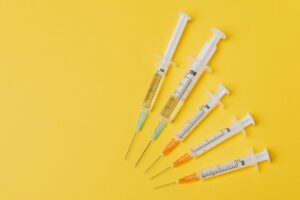Supplements Dopamine and Superfood—it’s the buzzword everyone seems to be talking about. This tiny neurotransmitter holds immense power over our mood, motivation, and overall well-being. But what happens when our dopamine levels dip? Can we rely on superfoods or supplements to bring us back to our energetic, enthusiastic selves? Let’s dive deep into the world of dopamine boosters and figure out which one reigns supreme.
Understanding Dopamine
What is Dopamine?
Dopamine is a chemical messenger in the brain, responsible for transmitting signals between nerve cells. It plays a crucial role in how we feel pleasure, think, and plan. In simple terms, it’s our brain’s reward center, influencing our mood, sleep, and learning abilities.
The Role of Dopamine in the Body
This neurotransmitter impacts numerous functions:
- Mood Regulation: Dopamine helps manage how we experience pleasure and joy.
- Cognitive Function: It aids in learning, memory, and decision-making.
- Motor Control: It plays a part in movement and coordination.
Symptoms of Low Dopamine Levels
When dopamine levels are low, you might feel:
- Fatigued and sluggish
- Unmotivated or apathetic
- Depressed or anxious
- Trouble focusing or remembering things
Natural Ways to Boost Dopamine
Benefits of Boosting Dopamine Naturally
Naturally boosting dopamine can help improve mood, increase energy levels, and enhance cognitive functions without the risk of dependency or side effects associated with synthetic options.
Risks of Artificial Dopamine Boosts
Artificially boosting dopamine through certain medications or drugs can lead to addiction, tolerance, and potential damage to the dopamine receptors, making natural production more difficult over time.
Superfoods for Dopamine

What Are Superfoods?
Superfoods are nutrient-rich foods considered to be especially beneficial for health and well-being. They are packed with vitamins, minerals, and antioxidants that support overall health. If you’re looking to optimize your diet further, check out our guide on 5 Fibre-Filled Fails: Avoid These Common Mistakes in Your Diet to ensure you’re making the most of your nutritional choices.
Top Superfoods to Boost Dopamine
Bananas
Bananas are rich in vitamin B6, which is essential for dopamine production. They also contain tyrosine, an amino acid that helps increase dopamine levels.
Almonds
Almonds are packed with phenylalanine, another amino acid that plays a key role in dopamine production. They are also a good source of healthy fats and proteins.
Avocados
Avocados contain healthy fats and are high in vitamin B6, which aids in the synthesis of neurotransmitters, including dopamine.
Dark Chocolate
Dark chocolate is a favorite dopamine booster. It contains phenylethylamine (PEA), which stimulates the brain to release more dopamine.
Green Tea
Green tea contains L-theanine, an amino acid that can cross the blood-brain barrier and increase dopamine levels.
Supplements for Dopamine

What Are Supplements Dopamine?
Supplements Dopamine are dietary supplements designed to increase the levels of dopamine in the brain. They often contain ingredients like amino acids, herbs, and vitamins that support dopamine production.
Types of Supplements Dopamine
L-Tyrosine
L-Tyrosine is an amino acid precursor to dopamine. It can help improve mood and cognitive function, especially under stress.
Mucuna Pruriens
This tropical legume contains L-DOPA, a direct precursor to dopamine. It’s known for its ability to boost dopamine levels naturally.
Ginkgo Biloba
Ginkgo Biloba is an herb that enhances cognitive function and can help increase dopamine levels by improving blood flow to the brain.
Rhodiola Rosea
Rhodiola Rosea is an adaptogen that helps the body manage stress and can support dopamine production.
Superfoods vs. Supplements Dopamine: The Great Debate
Effectiveness of Superfoods
Superfoods provide a natural and holistic approach to boosting dopamine. They offer additional health benefits like improved digestion, better heart health, and stronger immunity.
Effectiveness of Supplements
Supplements can offer a more targeted and potent approach. They are especially useful for individuals with specific deficiencies or those who need a quick boost.
Pros and Cons of Superfoods
Pros:
- Natural and holistic
- Provides additional nutrients
- Low risk of side effects
Cons:
- Slower to show effects
- Requires consistent consumption
Pros and Cons of Supplements
Pros:
- Quick and effective
- Easy to measure dosages
- Can address specific deficiencies
Cons:
- Potential for side effects
- Risk of dependency or tolerance
Scientific Evidence and Research
Studies Supporting Superfoods
Research indicates that nutrient-rich diets, including superfoods, are linked to better mental health and cognitive function. Foods like dark chocolate and green tea have been shown to positively impact dopamine levels.
Studies Supporting Supplements Dopamine
Studies have demonstrated the effectiveness of supplements dopamine like L-Tyrosine and Mucuna Pruriens in boosting dopamine levels, especially in individuals with deficiencies or under high stress.
Comparative Studies
Comparative studies suggest that both superfoods and supplements have their place in dopamine management. The choice often depends on individual needs, lifestyle, and health goals.
Choosing the Right Option
Factors to Consider
When deciding between superfoods and supplements, consider:
- Your overall health
- Dietary preferences
- Specific health conditions or deficiencies
- Long-term vs. short-term needs
Personal Health Goals
Align your choice with your health goals. Are you looking for a quick boost, or are you aiming for long-term wellness?
Consultation with Healthcare Professionals
Always consult with a healthcare professional before starting any new dietary or supplement regimen to ensure it’s safe and appropriate for your needs.
Practical Tips for Boosting Dopamine Naturally
Balanced Diet Tips
Include a variety of dopamine-boosting foods in your diet. Focus on fruits, vegetables, nuts, and lean proteins.
Lifestyle Changes
Maintain a regular sleep schedule, reduce stress through mindfulness or meditation, and stay hydrated.
Exercise and Its Impact on Dopamine
Regular physical activity can significantly boost dopamine levels. Aim for at least 30 minutes of exercise most days of the week.
Combining Superfoods and Supplements
Can They Work Together?
Yes, superfoods and supplements can complement each other. Combining them can provide a balanced approach to boosting dopamine levels.
Best Practices for Combining Both
- Start with a balanced diet rich in superfoods.
- Use supplements as needed, preferably under professional guidance.
- Monitor your body’s response and adjust as necessary.
Common Myths About Dopamine
Debunking Popular Myths
- Myth: Dopamine is only about pleasure. Fact: Dopamine also plays a role in motivation, learning, and motor control.
- Myth: More dopamine is always better. Fact: Excessive dopamine can lead to issues like addiction and impulsive behavior.
- Myth: Only drugs can boost dopamine. Fact: Natural methods like diet and exercise can effectively increase dopamine levels.
Potential Side Effects
Side Effects of Superfoods
While generally safe, some superfoods can cause allergic reactions or digestive issues in certain individuals. It’s important to introduce new foods gradually and observe how your body reacts.
Side Effects of Supplements
Supplements dopamine can sometimes cause side effects such as headaches, nausea, or sleep disturbances. Overuse can lead to more serious health issues, so it’s crucial to follow recommended dosages and consult with a healthcare professional.
Real-Life Success Stories
Personal Accounts of Dopamine Boosts
Many individuals have shared their journeys of improved well-being through natural dopamine boosters. For example, Sarah, a busy mom, found that incorporating superfoods like avocados and dark chocolate into her diet helped her feel more energetic and motivated throughout the day.
Testimonials on Superfoods and Supplements Dopamine
John, a college student, turned to supplements like L-Tyrosine during exam season and noticed a significant improvement in his focus and mental clarity. Meanwhile, Emma, a fitness enthusiast, swears by the combination of green tea and Rhodiola Rosea to keep her energy levels high and stress levels low.
Conclusion
In the battle of superfoods vs. supplements dopamine, there’s no one-size-fits-all answer. Both have their unique benefits and potential drawbacks. Superfoods offer a natural, holistic approach with additional health benefits, while supplements provide a more targeted and often quicker solution. The best choice depends on individual health needs, lifestyle, and personal preferences. If you’re interested in optimizing your diet further, explore our guide on the 30 30 30 Weight Loss Method: 7 Hacks for Portion Control to learn effective portion control strategies.
FAQs
Can Superfoods Replace Supplements?
Superfoods can provide a natural way to boost dopamine, but supplements can be helpful for addressing specific deficiencies or for those who need a more potent boost.
How Quickly Do Dopamine Supplements Work?
The effects of dopamine supplements can vary. Some people may notice improvements within a few days, while others might take a few weeks to experience significant changes.
Are There Any Foods That Decrease Dopamine Levels?
Highly processed foods, sugary snacks, and excessive alcohol consumption can negatively impact dopamine levels. It’s best to avoid these to maintain healthy dopamine levels.
Can Exercise Alone Boost Dopamine?
Yes, regular exercise is a powerful natural way to boost dopamine. Activities like running, swimming, or even dancing can significantly enhance dopamine levels.





Pingback: Supplements Warehouse: Stocking Up for Weight Loss Journey - Well Weighed
Pingback: Peptides for Weight Loss: Are They Worth the Hype? - Well Weighed
Pingback: Pineapple Juice: The Ultimate Detox Drink for a Healthier You - Well Weighed